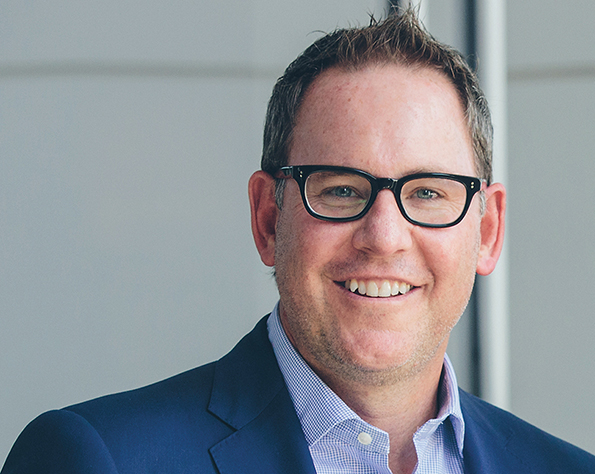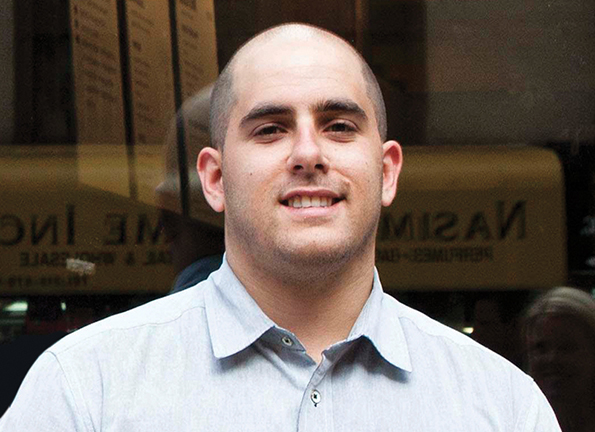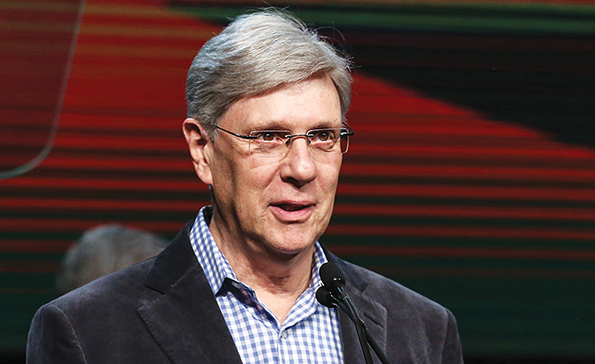
Russ Bendel CEO, Habit Restaurants Inc.
Expanding and improving restaurants has been habit-forming for Russ Bendel, chief executive of Habit Restaurants Inc., whose career has included leadership positions at Outback Steakhouse, Mimi’s Café and The Cheesecake Factory.
In the last six years, Bendel has overseen the growth of the Habit Burger Grill, taking the concept public last fall. The Habit, as it is known locally in its Southern California home, became the first of the “better burger” segment — which includes Five Guys Burgers and Fries, Smashburger and Shake Shack — to go public. The concept began in 1969 in Santa Barbara, Calif.
“[Habit] has done better not only with the service platform, but with improvements to the interior and with innovation on the menu side,” said Darren Tristano, executive vice president at Technomic Inc. “Under Russ’ leadership, they have really evolved — and quickly.”
Habit Restaurants raised $90 million in its debut on the public market in November, doubling its share price on its first day of trading. At the time, Bendel said the cash would go toward retiring debt as well as long-term expansion.
Private-equity firm KarpReilly LLC, which retains a majority stake in Habit Restaurants, recruited Bendel from The Cheesecake Factory in 2008. Before that, KarpReilly, which was also an investor in Mimi’s Café, persuaded Bendel to leave Outback Steakhouse to become chief executive of the family-dining chain.
When Bendel took the position at Habit Restaurants, the Habit was a 23-unit chain with a cult following. Today, the brand has more than 100 units in California, Utah, Arizona and New Jersey, and has projected that it could eventually reach 2,000 units in the U.S.
— Dina Berta
Mario Del Pero

Mario Del Pero CEO, Mendocino Farms
Mario del Pero, the man behind the buzzed-about Mendocino Farms chain, has established himself as one to watch in restaurant-rich Southern California. His eight-unit fast-casual sandwich shop has enjoyed a cultlike following and slow yet steady growth since the first unit opened in Los Angeles a decade ago.
By bringing premium ingredients, sophisticated decor and heightened service to a classic sandwich shop model, he’s been able to stand out in the competitive fast-casual space. The chain’s menu features dishes created by former fine-dining chef Judy Han, such as a bánh mì with caramelized Kurobuta pork belly and tender smoked pastrami created in house. Restaurants feature such design touches as marble, plush couches, foosball tables and even live trees growing in the dining room.
“Mario is a visionary,” chef Han told LA Downtown News in 2012. “He always thinks about what’s in the future and pushes toward that goal.”
Del Pero previously told NRN he saw an opportunity for Mendocino Farms, where sandwiches average about $11, to reach the growing number of consumers who are “money rich but time poor.”
Del Pero has long possessed that entrepreneurial spirit. In 1995, he deferred enrollment to UC Berkeley’s respected Boalt law school to become a general manager for Baja Sharkeez, a beach-theme restaurant chain in Southern California. That experience led to the debut of del Pero’s fast-casual Asian concept Skew’s Teriyaki in 1998, which he sold in 2001 after building it up to three units. He founded Mendocino Farms in 2004.
Investors have taken notice of del Pero and Mendocino Farms as well. In 2010, Cosi Restaurants founder Nick Marsh, through New York-based GrowthPoint Restaurants, made a $1.2 million commitment to help grow the concept. And in 2012, Catterton, a growth-minded private-equity firm, also invested in the brand.
Jonathan Owsley, a partner at Catterton, told Nation’s Restaurant News that he credits the success of the brand not only to its unique offering and great unit economics, but also to its strong leadership. Now del Pero is focused on growth. His next goal — 30 units in Southern California by 2018.
— Fern Glazer
Greg Dollarhyde
Greg Dollarhyde, CEO, Veggie Grill

Hard work has paid off for Greg Dollarhyde, CEO of the Santa Monica, Calif.-based Veggie Grill chain.
Dollarhyde took part-time jobs in high school, and helped open two restaurants by the time he was 23. He graduated fourth in his class at Cornell University’s School of Hotel Administration, and earned an MBA a year later. Over the past three decades he has been chairman and/or chief executive of six different restaurant companies, including Zoe’s Kitchen Inc. and Baja Fresh Mexican Grill.
Simply put, Dollarhyde is known in the industry as a business expansion expert. And now he’s turned his sights on growing Veggie Grill, a brand serving exclusively plant-based dishes. The play is to see if a fully vegetarian concept speaks to today’s consumers, who are indeed growing more health-conscious and ethically inclined.
“We intend to change the way people eat, think and talk about vegetarian food,” Dollarhyde told Nation’s Restaurant News when the concept was named a Breakout Brand in 2013. “In Southern California, at least, we’re well on our way.”
Since 2011, when he joined the chain, Veggie Grill has grown from six restaurants to nearly 30 locations in California, Washington and Oregon. It also raised more than $30 million through several rounds of funding, including a minority equity investment by Brentwood Associates.
Brentwood was also an equity partner in the Dallas-based Zoës Kitchen chain, which Dollarhyde helped grow from 19 locations to 45 restaurants in less than three years.
In an past interview with the Los Angeles Times, 62-year-old Dollarhyde admitted that his formula for success is simple: “Have a positive attitude, don’t act entitled and know your stuff ... Show up ready to play.”
— Dina Berta
Sam Fox
Sam Fox, Founder and CEO, Fox Restaurant Concepts

Sam Fox has built a reputation as a prolific and creative restaurateur for growing his Phoenix-based company, Fox Restaurant Concepts, into a 15-brand portfolio comprising 43 restaurants, which are primarily located in the Southwest.
Now he’s shifting into serious growth mode, with his sights set on turning his regional powerhouse into a national player.
“We have a good foundation of leadership in the organization,” Fox told NRN late last year. “We’ve had success with our brands in Arizona and have a lot of restaurants there. Now it’s time to take some of those on the road.”
A key growth vehicle is 10-unit True Food Kitchen, a health-focused casual-dining brand developed with wellness expert Dr. Andrew Weil and financed with an equity investment by P.F. Chang’s China Bistro Inc. True Food now has units in Arizona and California and in the past year has opened in Atlanta and Houston. Plans call for four new restaurants in 2015 and three more in 2016.
The company also plans to focus on fast-casual farm-to-table concept Flower Child, which debuted in Phoenix last year. Fox said he aimed to have as many as 13 units open by the end of 2016.
The company this month announced the sale of nine units of its fast-casual Sauce Pizza & Winery, founded in 2003, so the company could continue its “focus on growing up-and-coming brands.”
The 46-year-old Fox said his company will continue to develop such varied concepts as North Italia, Zinburger, Blanco Tacos + Tequila, Culinary Dropout and other singular establishments such as the fast-casual Wild Flower, the upper-scale Olive & Ivy, the airport-based Modern Burger and The Arrogant Butcher.
Fox’s innovative thinking and Midas touch earned him the 2014 Richard Melman Innovator of the Year Award, given each year by Nation’s Restaurant News sister publication Restaurant Hospitality.
Melman, the award’s namesake and a celebrated multiconcept operator in his own right, said of Fox: “He’s one of the brightest young stars in the industry.”
Contact Ron Ruggless at [email protected].
Follow him on Twitter: @RonRuggless
Nicolas Jammet
Nicolas Jammet, Co-founder and CEO, Sweetgreen

As the co-founder and CEO of Washington, D.C.-based Sweetgreen, Nicolas Jammet is at the helm of the rapidly growing movement of restaurant chains looking to provide consumers with fresh, locally sourced ingredients and environmentally friendly locations.
Jammet, along with partners Jonathan Neman and Nathaniel Ru, opened the first location of the fast-casual Sweetgreen in Washington, D.C., in 2007, shortly after graduating from Georgetown University. From the beginning, the brand focused on using natural proteins and locally sourced produce in salads, juices, yogurt and hot grain dishes. Since then, Sweetgreen has become something of a phenomenon, growing to 29 units on the East Coast. It plans to expand to the West in early 2015.
Jammet and his partners’ ability to connect with tech-savvy, health-conscious Millennials has not only made it a consumer favorite, but has also garnered the interest of investors and major industry players. In 2013, the brand received $22 million from Revolution Growth, the investment fund started by former America Online chief executive Steve Case, who also joined Sweetgreen’s board. And in late 2014, Revolution Growth led a second round of funding of $18.5 million, which included investments from top restaurateurs like Danny Meyer, the CEO of Union Square Hospitality Group and creator of Shake Shack, and chef-restaurateur Daniel Boulud. Not a shabby lists of investors and advisors.
Sweetgreen’s mission extends beyond local ingredients. The brand has made community outreach a top priority, including Sweetgreen in Schools, which is a school adoption program that includes wellness workshops to teach students the importance of healthy eating, making Jammet and his partners true pioneers of change and innovation in the restaurant industry.
— Charlie Duerr
Richard Melman
Richard Melman, Founder and chairman, Lettuce Entertain You Enterprises

If you ask Richard Melman the secret to his success as founder of Chicago-based Lettuce Entertain You Enterprises Inc., one of the nation’s most iconic and creative hospitality companies, he’ll say its nothing special.
“We’re a very disciplined organization,” Melman has said. “Our costs are good. We surround ourselves with good people and we train them well. Not a lot of fancy stuff, just the basics.”
Many in the restaurant industry would strongly disagree. Melman is a true original and the epitome of an entrepreneur. His magic touch includes an uncommon creativity and insight, and an aptitude for surrounding himself with talented people.
More than 6,000 people work for LEYE, which runs more than 75 restaurants in its multiconcept portfolio.
Melman’s restaurant career began in the 1970s, when he and the late Jerry Orzoff opened burger joint R.J. Grunts, which quickly became one of the hottest restaurants in Chicago. Over the next few decades, Melman created and launched such concepts as Maggiano’s Little Italy, Big Bowl, Everest, Foodlife, M Burger, Shaw’s Crab House, Wildfire and Wow Bao.
Melman established a pattern of partnering with culinary superstars — chefs Rick Tramonto and Gale Gand for fine-dining restaurant Tru, and Jean-Georges
Vongerichten for Vong-Chicago. LEYE also expanded into Las Vegas with concepts in the Paris Hotel, Eiffel Tower.
Now Melman’s influence also lives on through his three children, Jerrod, Molly and R.J., who are active in the company, and have been opening a new generation of LEYE restaurants, including Sub 51, Studio Paris and RPM Italian.
— Dina Berta
Danny Meyer
Danny Meyer, CEO, Union Square Hospitality Group

To get a measure of Danny Meyer’s success, go to any Shake Shack in New York City, where the line will typically snake out the door every day, rain or shine. Or if your wallet allows, try any of his fine-dining restaurants, such as Gramercy Tavern or Blue Smoke.
Long a fixture of the New York restaurant scene — starting as a 27-year-old with Union Square Cafe in 1985 — Meyer championed American food and unfussy fine dining, building Union Square Hospitality Group into a restaurant conglomerate operating 12 concepts and a busy catering division.
“The food trends and the decor trends change every single year. I think the way to stay ahead is to stay with your own heart. People can taste authenticity,” he reportedly said at an event in late 2014.
It was the launch of the burger joint Shake Shack, however, that put the spotlight on Meyer outside New York foodie circles. Beginning as a summertime hot dog stand in Madison Square Park in 2001, Shake Shack became a year-round location in 2004, and in 2010 expanded beyond New York. The chain’s first international location opened in Dubai in 2011, and today the brand has close to 60 restaurants worldwide.
Along the way, Meyer has authored books — “Setting the Table,” about the business lessons he has learned, is one — and backed chefs such as Floyd Cardoz of New York hot spot White Street. Meyer is also an investor in the growing fast-casual salad concept Sweetgreen, the founder of which is also on the NRN Power List.
Union Square Cafe is scheduled to close at the end of 2015, a victim of New York’s real estate inflation. Meyer could be too busy to mourn it, though; Shake Shack in late December filed for an initial public offering that could raise as much as $100 million. One source quoted by Bloomberg speculated the IPO could push the chain’s value to as high as $1 billion.
— Mercedes Cardona
Rick & Elise Wetzel
Rick and Elise Wetzel, Co-founders, Blaze Fast-Fire’d Pizza

Competition in the fast-casual “better pizza” segment continues to heat up, especially with major growth plans from husband-and-wife team Rick and Elise Wetzel. The duo is well on its way to expanding their Pasadena, Calif.-based Blaze Fast-Fire’d Pizza brand nationwide, and standing out in an increasingly crowded segment.
The couple, who also founded Wetzel’s Pretzels, opened its first Blaze location in 2012. Guests can customize existing menu items or create their own delicacies based on a wide selection of fresh, artisan-crafted ingredients. Each 11-inch pie is baked in an open-flame oven and is ready in three minutes.
Blaze may be operating in a crowded market — the fast-casual pizza scene includes Uncle Maddio’s, Project Pie, Pie Five, MOD Pizza, 800 Degrees, PizzaRev and Pieology, among others — but the Wetzels say Blaze has what it takes to stand out from the pack. It’s quickly building a national footprint while many competitors remain regional.
Helping the push is backing by some high-profile investors, including former California First Lady Maria Shriver, movie producer John Davis and Boston Red Sox co-owner Tom Werner. The team will open its 70th location in March in Dallas, and plans to open an average of one new location every five days, according to a company statement. That will keep Blaze on track to open its 100th location by next October.
The Wetzels expect to maintain this feverish momentum through an assertive franchising program. Introduced in late 2012, Blaze’s franchise program quickly expanded the brand’s breadth across California. Since then, additional agreements spurred operations into Milwaukee and Madison, Wis., as well as Connecticut and New York. The brand’s newest location, in Raleigh, N.C., was set to open in December.
At press time, the chain had franchise agreements pending that will introduce the brand in Denver and Portland, Ore. In total, the company has agreements in place to open a total of 331 restaurants in 36 states and Washington, D.C.
— Deena Amato-McCoy
This article has been revised to reflect the following correction:
Correction: Jan. 21, 2015 An earlier version of this article referred to private-equity firm Catterton incorrectly. The firm's name is Catterton, not Catterton Partners.





